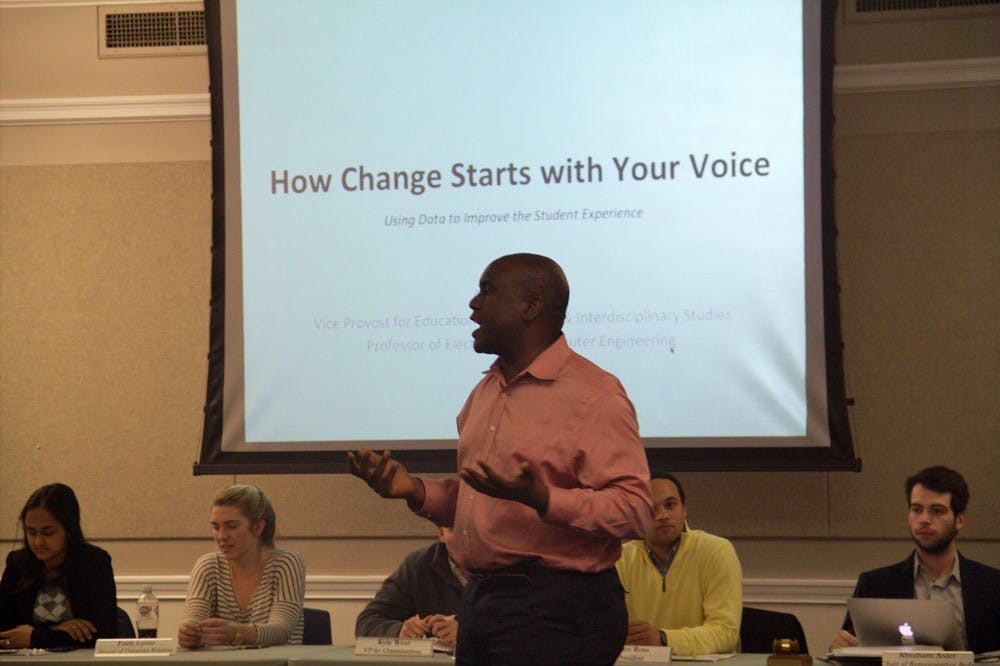Archie Holmes, vice provost for educational innovation and interdisciplinary studies, spoke to Student Council Tuesday about the 2015 Student Experience in the Research University survey.
Holmes said the purpose of the survey is to look at how the undergraduate experience is for students.
“There’s lots of interest in the educational experience of students,” he said. “What we’re really interested [in] is what is driving these numbers.”
Holmes said the SERU survey has two primary components — a core section which every student takes and a series of modules into which students are randomly assigned.
“Having a lot of response helps the departments understand what it means to be a student here,” Holmes said.
From the survey, fourth-year students reported improvement throughout their academic career in expected ways, including improvement in areas such as leadership skills and analytical and critical thinking. However, Holmes said other areas, such as foreign language, did not show as much positive development.
The survey provided an opportunity for the University to compare the findings to those at similar universities, including the University of North Carolina at Chapel Hill and the University of Michigan.
Students at the University, in comparison to those at other institutions, have reported spending less time attending class or discussion, and first and second-years have reported a lower likelihood of being accepted into a desired major program.
In response, Holmes said departments are beginning to address the issues in a variety of ways.
“[The departments have] improved communication, increased academic rigor and added instruction and advising for that major about life after U.Va,” he said.
Holmes said an advising survey conducted in 2014 showed improvable rates of advisor satisfaction. While advisors seem to be an appropriate match for students, he said, many students think they need more time to meet with advisors.
He said the survey showed stronger student-advisor relationships from students who had taken a College Advising Seminar.
“The College has expanded its COLA program to approximately 60 this past fall,” Holmes said. “How do we take this and translate it into engineering?”
Holmes also detailed upcoming initiatives to improve student experience, including the recent Lewis Leadership Program, connecting academic work with community based service and the Undergraduate Student Opportunities in Academic Research Program.
In order to better translate survey data into an improved undergraduate experience, Holmes expressed his desire to increase student responses to the survey. Twenty four percent of the student body responded to the 2014 survey while 16 percent have responded to the 2015 survey as of now.
At Tuesday’s meeting Council President and fourth-year Engineering student Jalen Ross also gave updates regarding campus sexual assault policy advancements in the Virginia General Assembly.
Ross said the legislation — which includes a bill requiring colleges to mark academic transcripts if a student is found guilty of sexual assault and another with mandatory reporting requirements — was largely reactive to the University’s last semester.
The mandatory reporting legislation originally required University faculty members to report information on sexual assault to law enforcement. But Ross and other students, who were concerned with police involvement, attended the committee session and managed to negotiate to slightly alter the proposals.
“[We] got it rationed down to a more reasonable compromise,” Ross said.
Instead, reports will go to a Title IX coordinator for review by a threat assessment team.
“We’re working on getting ODOS carved out [of the threat assessment team] so at least there’s someone in Office of the Dean of Students that you can go to in confidentiality,” he said.
Ross invited Council members to accompany him on future trips to Richmond because he said student voices can make a difference.
“The most impactful thing you can do is show up and show that students are interested,” Ross said.







